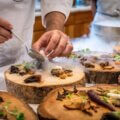Did you know that the french don’t really have one word in their vocabulary for nuts?
 Many people mistakenly think the word noix or noisettes is the word for nuts.
Many people mistakenly think the word noix or noisettes is the word for nuts.
Indeed this might be just the word you’re looking for if you’re allergic to certain types of nuts only, but if you’re allergic to peanuts or all nuts you need to use a completely different phrase and approach in France.
What do the french call nuts?
Fruits secs is the term used in France to describe dry fruit. Note that is DRY fruit not dried fruit. The dictionary meaning explains it as food that is naturally dry and contains a kernel.
They also say fruits a coque and the word coque means shell or husk which when explained, does make sense, but caused us endless confusion on our holiday skiing in France earlier this year.
The words for other nuts are as follows:
- Almond – l’amande (Pronounced: lah mahnd)
- Cashew – l’anacarde (pronounced: lah-nah-card)
- Chestnut – le marronnier or la châtaigne (pronounced: leh mah-rohn, lah shah-tay-nhy)
- Hazelnut – la noisette (pronounced: lah nwah-zeht)
- Walnut – la noix (pronounced: lah nwah)
- Peanut – l’arachide or la cacahouète (pronounced: lah-rah-sheed, lah kah-kah-wayt)
- Pecan – noix de pécan (pronounced: Nwah de paycan)
So how have you found eating out in France?
Have you tried it? Do you find it easy? I am lucky to have a husband who speaks very good French so this does help but it is very scary and difficult even for him and I wonder how we would have survived without his knowledge of the language.
If you can communicate that you wish your steak to be cooked just in oil because you cannot eat any butter due to an allergy there is usually something. I do pity the vegan person with allergies – the French are not that kind to anyone who doesn’t want to eat their delicious meat. I find I order steak medium rare they breath a sigh of relief the the English tourist at least understand how meat should be cooked.
Allergy thankfully is a very similar word in french – allergie.
I’d love to hear how you have got on eating out on holiday and in particular how you manage the language barrier? The translation cards need to get a little complicated when you have multiple allergies…












There’s also noix de bresil, noix de macadamia etc. which do translate quite well.
The French Wiki link below is a good resource:
http://fr.wikipedia.org/wiki/Fruit_sec
It includes the following list:
Liste de fruits naturellement secs
Partie comestible de la Noix de Grenoble.Amande (Prunus dulcis), en coque, mondée, tranchée, effilée, en poudre
Cacahuète (Arachis hypogaea), en coque, entière, grillée
Noisette (Corylus avellana), en coque, entière, en poudre
Noisette chilienne (Gevuina avellana), entière, en coque
Noix (Juglans), en coque, en cerneaux, en poudre
Noix du Brésil (Bertholettia excelsa) en coque, entière
Noix de cajou
Noix de coco (Cocos nucifera), effilée, en poudre
Noix de macadamia (Macadamia integrifolia), entière, en poudre
Noix de pécan (Carya Illinoinensis), en coque, en cerneaux, en poudre
Pignon de pin (Pinaceae), on mange l’intérieur de la graine. Le pignon n’est pas un fruit au sens strict du terme.
Pistache (Pistacia vera), salées en coque, grillées, en poudre
Thanks Keene – a very concise list. I will udpate my blog with these when I have time. I’m guessing Pin is pine nut? The more I think about this the more I realise the french way of labelling actually helps quite a bit. It gives the allergic consumer so much more information. Instead of saying just ‘may contain nuts’ or ‘contains nuts’ it actually tells you the EXACT nut in most cases but I have to say I was under the misguided opinion that noix was nuts for years.
I’ve just returned from France after reacting to fruits a coques that was in a burger with hash browns.
The language barrier wasn’t a problem in anywhere we went, as you say allergie is easy to recognise. I asked about my allergies and in some places (mainly chain restaurants) there were allergy lists but had never heard the phrase fruits a coques.
Lesson learnt after a brief visit to French A&E.
ah, as someone whose mother-tongue is French, I wish to make a small correction:
cashew nut = noix de cajou.
And to be pedant, les marrons should refer to horse chestnuts, the one you can’t eat, but we do sometimes call les châtaignes = marrons.
I stand corrected! Thanks for spotting that. Google doesn’t get it right all the time
I loved working in the Med and had great experiences. However, having lived in France and Italy, I found that allergy awareness was very low compared to Northern Europe and the USA. It was more likely to be interpreted as being picky rather than associated with illness.
For example, I experienced a doctor refusing to renew my epipen stating that it was not appropriate for anyone outside of the medical profession to carry such strong drugs. Moreover, on stating that I was allergic, restaurants would often suggest that I pick off the nuts from food stuff or would state that it was only a small amount of nuts in foods so it shouldn’t be a problem.
I don’t believe that this was an attempt to be awkward or difficult, I just found that allergies were highly uncommon in this area of the world and so very few people were aware of the care and precautions necessary. I would love to know why this was the case and whether it is a genetic predisposition or an environmental trigger which has caused this geographic split!
My advice to anyone travelling to these areas with an allergy is to pick the most familiar foods and safest possible options. I entirely avoided reactions whilst working abroad through cooking my own food, being very very safe in my choices in restaurants and making an effort to explain the consequence of an allergy as well as simply stating that you have one.
Have a great trip everyone!
Steak and chips! Yep. Stay safe. Thanks for sharing. I have found the same.
This blog and comments have been so informative! Thank you!! We leave for France next month and my 3 year old is allergic to peanuts. We will have our own kitchen so I plan to make all of her meals, but would anyone mind sharing their experiences with the food labeling in France? I am wondering what I am in for when I get to the market.
Thank you!
The supermarkets are brilliant there. Not sure what you’ll get Europe has the same rules in all countries so if you know what the word is for peanuts you’ll be fine. Just be careful of nuts on ice cream. They don’t often understand quite what we mean. Markets will be fine. Just enjoy the fresh local produce and cook from scratch. Hope you have fun
I hope this blog post is still active because I would welcome your wonderful input. I am trying to prepare to take my peanut (only) allergic kid to France for the first time in 2 weeks. She can safely eat all tree nuts but I am worried about the looser labeling that I am hearing about in France. I don’t want to be overboard in preventing her from eating things that are likely perfectly safe because I am not sure whether a fruits a coques label includes peanuts or not. Or if Noix typically intends to include peanuts as well. Any insights? And while I’m asking, any restaurant recos for a peanut allergy only child who would love to try some new things including desserts in a place where peanuts aren’t slapped on top of everything like they are here in the US?
I would say, in a foreign country err on the side of caution and be very aware. They have a word for crumbled or ground nuts which is different to the whole nut and i’ve been served ground up hazelnuts and been so confused, having asked for no nuts at all. The server was perplexed as these were not whole hazelnuts. Just be very careful. This happened a long time ago and I think nut allergies are far better understood now. Get some allergy cards which have the translations on them that you can present in a restaurant for the staff/chef to read. And they do tend to slap peanuts/nuts on things so watch out for this too. It’s very confusing when you have the language barrier to contend with but if in any doubt, just don’t risk puddings. hope you have a lovely time. And I’d love to hear how you got on.